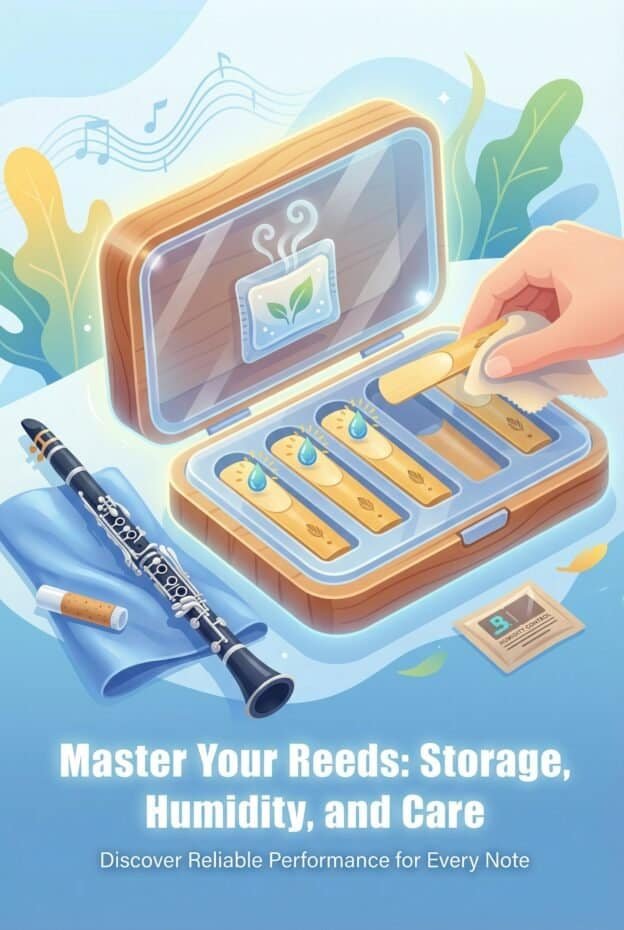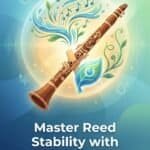Store clarinet reeds in a cool, dark place at about 40-60% relative humidity, dry them carefully after playing, and keep them in a ventilated or humidity-controlled reed case. Label and rotate reeds, monitor humidity with a small hygrometer, and avoid extreme heat or moisture to prevent mold, warping, and cracking.
Why Clarinet Reed Storage Matters
Clarinet reed storage matters because cane is a living, plant-based material that keeps reacting to humidity and temperature long after harvest. Good storage slows this reaction so the reed stays flat, stable, and responsive. Poor storage speeds it up, causing warping, mold, cracking, and unpredictable tone from day to day.
Clarinet reeds are made from Arundo donax, a porous cane that absorbs and releases water. This hygroscopic nature means reeds swell in damp air and shrink in dry air. Every swell and shrink cycle changes the reed's shape and internal stress, which directly affects vibration, response, and intonation on the mouthpiece.
Historically, players stored reeds in simple wooden or leather cases with little control over humidity. Early 20th century clarinetists, including those playing Martin Freres instruments, often kept only a few reeds in a pocket case. Modern players have access to humidity-controlled boxes, hygrometers, and sealed pouches that make consistent storage much easier.
Storage also affects cost and practice time. A well-stored reed can last for weeks of regular playing, while a poorly stored reed might warp or mold in days. Better storage means fewer emergency reed changes, more predictable rehearsals, and less money spent on constant replacements.
For students and professionals alike, stable reed storage translates directly into stable performance. When reeds behave the same from day to day, you can focus on embouchure, air, and music instead of fighting a soggy, brittle, or unresponsive reed every time you open the case.
Key data: Natural cane reeds are most stable at about 40–60% relative humidity, and many players report up to 2x longer reed life with consistent humidity control compared to uncontrolled storage.
Recommended Humidity & Temperature Ranges (measured values and effects)
Clarinet reeds stay most stable at about 40-60% relative humidity (RH) and a moderate temperature around 18-24 °C (64-75 °F). In this range, Arundo donax cane holds enough moisture to stay flexible, but not so much that it swells, softens excessively, or grows mold in the reed storage case.
Below about 35-40% RH, reeds lose moisture and shrink. The tip can curl upward, the heart can stiffen, and the reed may feel harder than its marked strength. Players often notice a thin, edgy sound, slower response, and increased risk of tiny cracks along the tip or rails when the storage environment is too dry.
Above about 65-70% RH, reeds absorb moisture and swell. The tip may lie flatter on the mouthpiece, the reed can feel softer, and the sound may become fuzzy or unstable. In very humid reed storage, the cane never fully dries, which encourages mold and bacterial growth, especially around the vamp and tip.
Temperature interacts with humidity. High heat, especially above 30 °C (86 °F), speeds up moisture exchange and can warp reeds even at moderate RH. Leaving a reed case in a hot car or near a heater can quickly ruin reeds, even if the case itself is closed and appears protected.
Use a small digital hygrometer in your reed storage area or inside a larger reed case to track conditions. Many inexpensive models show both RH and temperature, so you can see when the environment drifts outside the safe range and adjust with humidity packs, silica gel, or ventilation.
Humidity targets: Ideal storage: 40–60% RH. Risk of brittleness: below 35% RH. Risk of mold and sogginess: above 70% RH. Try to keep daily swings under about 15% RH for best stability.
Players in very dry climates, such as high-altitude regions in Colorado or interior Australia, often need humidifiers or humidity packs inside reed cases. Players in tropical or coastal regions, such as Florida or Singapore, usually need more ventilation and possibly silica gel to avoid constantly soggy reeds.
Remember that the reed's internal moisture also changes while you play. Even if storage humidity is perfect, a long rehearsal saturates the cane. Proper drying before returning the reed to its case is just as important as the measured RH inside that case.
Choosing a Reed Storage Case: Ventilation, Airtight, and Humidity Control
The reed storage case you choose determines how easily you can keep reeds in a stable humidity range. Most options fall into three categories: ventilated cases, airtight cases, and humidity-controlled systems that combine sealing with moisture packs or built-in humidifiers.
Ventilated reed cases have small holes or breathable materials that allow air exchange. They are ideal for players in humid climates because they help reeds dry between uses and reduce mold risk. Many plastic or wooden reed guards with slits or vents fall into this category and hold reeds flat on a plate or glass surface.
Airtight reed cases seal more completely, often with gaskets or tight-fitting lids. On their own, they simply trap whatever humidity is already inside. In dry climates, this can help prevent reeds from drying out too quickly, but in humid environments, an airtight case without control can lock in excess moisture and encourage mold.
Humidity-controlled reed cases pair an airtight or semi-airtight shell with a moisture regulator, such as a two-way humidity pack, sponge-based humidifier, or built-in humidity control system. These are useful for players who travel often or live in regions with large seasonal swings in humidity.
Inside the case, look for features that support reed health. A flat glass, acrylic, or metal plate helps keep reeds from warping as they dry. Individual slots or channels prevent reeds from touching and chipping each other. Some cases include a small hygrometer so you can monitor RH without opening the lid.
Capacity also matters. A serious student or professional might keep 8-16 reeds in rotation, plus a few backups. A case that holds at least 8 reeds, with clear labeling or numbering, makes rotation easier. Beginners may start with a 4-reed case but often outgrow it as they learn to manage multiple reeds.
Case comparison: Ventilated cases are best in RH above 60%. Airtight plus humidifier is best in RH below 40%. Mixed climates benefit from semi-airtight cases with removable humidity packs for flexible control.
When choosing between ventilated and airtight storage, match the case to your climate and habits. If your reeds often feel soggy or moldy, prioritize ventilation. If they feel brittle and crack easily, consider a more sealed case with a small humidifier or humidity pack to raise the internal RH.
Instrument Anatomy and Why Case Choice Matters
The clarinet reed's vamp, heart, tip, and rails all respond differently to moisture. The thin tip and rails swell and warp fastest, while the thicker heart changes more slowly. A case that keeps the reed flat against a plate while it dries helps the tip and rails shrink evenly, preserving a balanced vibration pattern.
When the tip curls away from the mouthpiece due to dry storage, the reed may feel too hard and unresponsive. When the tip lies too flat from over-humid storage, the reed can feel too soft and buzzy. Good storage cases slow these shape changes so the reed's strength and response stay closer to what the maker intended.
Daily Handling, Cleaning and Drying Procedures
Daily handling and drying habits are just as important as the reed storage case itself. A simple, consistent routine after every practice or performance will keep reeds cleaner, flatter, and more reliable from day to day, with fewer surprises when you open the case.
After playing, gently remove the reed from the mouthpiece by holding the thicker stock, not the tip. Avoid twisting or bending. Lightly wipe off surface moisture from both sides with a clean, lint-free cloth or soft paper, taking care not to press or scrape the delicate tip area.
Let the reed air dry tip-down or flat on a clean surface for 5-15 minutes before closing it in the reed storage case. This short drying time allows surface water and saliva to evaporate so the reed does not sit in a wet, sealed environment that encourages mold and swelling.
Before playing, briefly rehydrate the reed. Many players simply moisten the reed in the mouth for 30-60 seconds. For a more controlled approach, you can dip the reed tip in distilled water for 5-10 seconds, then wipe off excess and let it sit for a minute to absorb moisture evenly.
Occasionally, give reeds a deeper clean. Every week or two, soak the playing reeds in warm (not hot) distilled water for 2-3 minutes. Swish gently, then rinse and pat dry. This helps remove dried saliva and mineral deposits without using harsh chemicals that could damage the cane or irritate your lips.
A mild cleaning solution of one part white vinegar to four parts water can be used sparingly for reeds that show early signs of buildup or odor. Soak for 1-2 minutes, rinse thoroughly with clean water, and dry completely before returning the reed to the storage case. Avoid alcohol or strong disinfectants that can dry and crack the cane.
Once dry to the touch but not brittle, store the reed upright or flat in your reed case. Ensure the tip is protected from impact. Never leave a reed on the mouthpiece in the case, as trapped moisture and pressure from the ligature can warp the tip and encourage mold inside the mouthpiece.
Weekly and Monthly Maintenance Checks
Once a week, open your reed storage case and inspect each reed under good light. Look for chips at the tip or rails, discoloration, or fuzzy patches that might indicate early mold. Check that each reed still lies flat against the plate or surface and has not visibly warped.
Use a small hygrometer to confirm the humidity inside or near your reed storage area. If RH is below about 40%, add a humidity pack or small humidifier. If it is above 60-65%, increase ventilation or add silica gel. Adjust gradually and recheck after a day or two to avoid sudden swings.
Organization, Labeling and Reed Rotation Strategies
Good reed storage is not only about humidity and cleanliness. Organization, labeling, and rotation keep your reeds at similar stages of wear, which gives you more consistent tone and response over time. A simple system can dramatically reduce the stress of finding a reliable reed before each performance.
Start by numbering your reeds. Use a fine-tip permanent marker to write a small number on the stock of each reed, such as 1 through 8. Some players also add the date they first played the reed, or a short code for the brand and strength if they use multiple types.
Rotate reeds daily. Instead of playing the same reed until it dies, use a different reed from your storage case each day. For example, play reed 1 on Monday, reed 2 on Tuesday, and so on. This gives each reed time to rest and dry fully between uses, which extends its lifespan and keeps it more stable.
Keep brief notes on reed behavior. A small notebook, phone app, or label on the reed case can track which reeds feel best for rehearsals, lessons, or performances. Mark reeds that feel unusually hard, soft, or unstable, and adjust your rotation so you rely on the most consistent ones for important events.
Separate reeds by status in your storage system. Many players keep three groups: new reeds that are still being broken in, regular rotation reeds for daily use, and backup reeds that are nearly worn out but still usable in emergencies. Some reed cases have multiple rows or compartments that make this separation easy.
For students, a simple color or symbol system can help. Use small stickers or colored dots on the reed case to mark your best reeds, or draw symbols next to the numbers. This visual cue helps you quickly choose a reed that matches the demands of the day, such as a softer reed for long practice or a more focused reed for ensemble work.
Record approximate playing hours. Even a rough estimate, such as tally marks for each rehearsal or concert, helps you understand how long a reed typically lasts in your storage conditions. Over time, you will see patterns that guide how many reeds you need in rotation to avoid last-minute emergencies.
Long-term Storage and Travel Considerations
Long-term reed storage and travel present special challenges, because reeds may sit unused for weeks or move quickly between very different climates. Planning ahead protects your investment in a good reed selection and prevents unpleasant surprises when you arrive at a rehearsal or open a case after a break.
For breaks longer than a week, store reeds clean, dry, and slightly humidified. After a final warm-water rinse and complete drying, place them in a reed storage case with a stable humidity source, such as a 45-55% RH humidity pack. Keep the case in a cool, dark place away from heaters, windows, and direct sunlight.
If you expect very long storage, such as over a summer break, consider reducing your active reed inventory. Keep only the most promising reeds and discard those already near the end of their life. Even in ideal storage, cane slowly ages, and very old reeds may not respond well after months of inactivity.
For air travel, carry your reed storage case in your hand luggage, not checked baggage. Cargo holds can experience extreme temperatures and pressure changes. A small, sturdy reed case with a modest humidity buffer will protect reeds from rapid drying or swelling during flights and layovers.
When traveling between climates, such as from a dry region to a humid one, expect reeds to change behavior over the first few days. Use your hygrometer to monitor the new environment and adjust your reed storage case with ventilation or humidity packs. Rotate reeds carefully and allow time to acclimate before critical performances.
Never leave reed cases in hot cars, on dashboards, or near radiators. Even a short exposure to temperatures above 30-35 °C (86-95 °F) can warp reeds, soften glue in some cases, and damage other clarinet accessories. Treat your reed storage case with the same care you give the clarinet itself.
Field Note from the Martin Freres Archives
Historical clarinet sets in the Martin Freres archives often include simple wooden reed holders with minimal sealing. Surviving reeds show heavy warping and cracking, especially from dry museum air. These artifacts highlight how modern humidity-controlled reed storage dramatically improves stability compared to early storage practices.
Troubleshooting Common Reed Problems (mold, warping, sogginess, brittleness)
Even with careful clarinet reed storage, problems like mold, warping, sogginess, and brittleness can appear. Each symptom points to specific storage issues. Learning to diagnose and correct these problems will save reeds and help you fine-tune your humidity and case choices for your climate and playing schedule.
Mold on Reeds
Mold usually appears as fuzzy, colored, or powdery spots on the vamp, tip, or underside of the reed. It thrives in high humidity, poor ventilation, and on reeds that never fully dry. Moldy reeds often smell musty and may feel slimy or unusually soft at the surface.
If you see light surface mold, discard the reed if you are unsure about safety. If you choose to attempt cleaning, soak the reed briefly in a solution of one part white vinegar to four parts warm water for 1-2 minutes, then rinse thoroughly and dry completely. Do not use bleach or strong chemicals on reeds.
To prevent mold, adjust your reed storage to encourage complete drying. Increase ventilation in your reed case, remove or reduce humidifiers, and avoid sealing wet reeds in airtight containers. Aim for storage humidity closer to 40-50% RH instead of 60-70% RH in mold-prone environments.
Warped Reeds
Warped reeds no longer lie flat on a glass or plate surface. The tip may curl up or down, or one side rail may lift higher than the other. Warping usually results from uneven drying, repeated extreme humidity swings, or storage on uneven surfaces inside the reed case.
To check for warping, place the reed flat-side down on a piece of glass or a mirror and gently press the stock. If you see light under the tip or rails, the reed is warped. Slight warping may be playable but often causes inconsistent response, squeaks, or uneven tone between registers.
Prevent warping by storing reeds flat on a smooth plate or in a case that gently presses them against a flat surface. Avoid leaving reeds on the mouthpiece or on cloth surfaces that can dry unevenly. Keep storage humidity stable, avoiding rapid changes from very dry to very humid air.
Soggy or Waterlogged Reeds
Soggy reeds feel heavy, overly soft, and slow to respond. The sound may be dull, unfocused, or unstable, and the reed may close up easily with normal air pressure. Sogginess usually comes from over-humid storage or from not allowing reeds to dry fully between playing sessions.
If a reed feels soggy, let it dry longer before storing. Open the reed case and allow more air circulation, or switch to a more ventilated reed storage case. If you use humidity packs, consider using a lower RH level or removing the pack temporarily until the reeds return to normal behavior.
In very humid climates, silica gel packets in your reed storage area can help absorb excess moisture. Replace or recharge silica gel as directed so it continues to function. Monitor RH with a hygrometer and aim to keep it closer to 45-50% rather than 60-70% when sogginess is a recurring problem.
Brittle, Cracked, or Chippy Reeds
Brittle reeds feel hard, unresponsive, and may show tiny cracks at the tip or along the rails. The sound can be thin, bright, and resistant, and the reed may chip easily with normal handling. This usually indicates storage in very low humidity, often below 30-35% RH, or repeated exposure to heat.
Once a reed has visible cracks or significant chipping, it is best to discard it. To protect the rest of your reeds, raise the storage humidity. Use a humidity-controlled reed case, add a 45-55% RH humidity pack, or place a small, well-contained sponge humidifier in your reed storage box.
Players in heated indoor environments during winter are especially prone to brittle reeds. Check the RH in your practice room and near your reed case. If the air is very dry, consider room humidifiers in addition to reed case humidification to protect both reeds and the wooden body of the clarinet.
Inconsistent Tone and Response
Inconsistent tone, where a reed feels different each day, often results from unstable storage conditions or irregular rotation. Reeds may feel perfect one day and too hard or too soft the next, even when your embouchure and mouthpiece setup are the same.
To stabilize tone, first ensure that your reed storage humidity is consistent from day to day. Then, adopt a clear rotation system so each reed has time to rest and dry between uses. Track which reeds perform best and retire those that become unreliable despite good storage.
Quick Reference: Reed Storage Checklist and Product Feature Comparison
A concise checklist and feature comparison can help you quickly evaluate your current clarinet reed storage setup and decide what to adjust. Use this section as a practical reference when shopping for reed cases, humidity tools, or when teaching students how to care for their reeds.
Daily Reed Storage Checklist
Use this quick checklist after every practice or performance:
- Remove the reed by the stock, not the tip, to avoid chips.
- Wipe off surface moisture gently with a clean, lint-free cloth.
- Let the reed air dry for 5-15 minutes before closing the case.
- Store the reed flat or upright in a protective reed storage case.
- Rotate to the next reed in your numbered system for the next session.
Use this quick checklist once a week:
- Inspect each reed for chips, cracks, warping, or discoloration.
- Clean playing reeds with a 2-3 minute warm-water soak if needed.
- Check humidity with a hygrometer near or inside your reed case.
- Adjust ventilation, humidity packs, or silica gel based on RH readings.
- Retire reeds that show mold, deep cracks, or severe warping.
Reed Case Feature Comparison
When comparing reed storage cases, focus on how each feature supports humidity control, protection, and organization. The right combination depends on your climate, how many reeds you use, and how often you travel with your clarinet.
- Ventilation: Look for vents or breathable materials if you live in a humid climate or struggle with mold. Less ventilation is better in very dry climates where reeds become brittle.
- Humidity control: Some cases include built-in humidifiers or slots for humidity packs. These are helpful in dry regions or for frequent travelers who encounter changing conditions.
- Flat plate or glass: A flat surface inside the case helps prevent warping by keeping the reed flat as it dries. This is especially useful for sensitive tip and rail areas.
- Capacity and organization: Choose a case that holds enough reeds for your rotation, ideally 8 or more for advancing players. Numbered slots or clear dividers make labeling and rotation easier.
- Durability and size: A sturdy shell protects reeds from crushing in a backpack or instrument case. Compact designs fit easily into clarinet cases or bags without adding bulk.
- Hygrometer integration: Some reed storage systems include a small hygrometer. If not, ensure there is room to place a separate mini hygrometer nearby for monitoring.
Match these features to your needs. For example, a band director in a humid coastal city might choose a ventilated, high-capacity case for student reeds, while a touring professional from a dry region might prefer an airtight, humidity-controlled case with a built-in hygrometer.
Expected Player Outcomes with Better Storage
With consistent, thoughtful clarinet reed storage, players can expect longer reed life, more predictable tone, and fewer last-minute emergencies. Reeds will respond more similarly from day to day, making practice more efficient and performances less stressful.
Over time, good storage habits reduce costs, because each reed lasts longer before it becomes too worn or damaged to play. Students and professionals alike benefit from a more stable setup, allowing them to focus on musical expression instead of constant reed troubleshooting.
Key Takeaways
- Keep clarinet reeds at roughly 40-60% relative humidity and moderate temperatures, using a hygrometer and appropriate reed storage case to avoid mold, warping, and brittleness.
- Dry reeds carefully after playing, clean them periodically with warm water or mild vinegar solution, and store them flat or upright in a protective case.
- Number, label, and rotate reeds so each has time to rest, giving you a consistent set of reliable reeds and reducing sudden failures before important performances.
- Match your reed case choice to your climate: more ventilation in humid regions, more sealing and humidification in dry regions, and adjustable systems for travel.
FAQ
What is clarinet reed storage?
Clarinet reed storage is the way you protect and organize reeds between playing sessions, including the case you use, the humidity and temperature around the reeds, and your routines for drying, cleaning, and rotating them. Good storage keeps reeds flat, clean, and stable so they last longer and play more consistently.
What humidity level is best for clarinet reeds?
The best humidity level for clarinet reeds is about 40-60% relative humidity. In this range, Arundo donax cane stays flexible without becoming soggy or brittle. Use a small hygrometer near your reed storage case and adjust with ventilation, humidity packs, or silica gel to stay close to this range.
How should I dry and clean my clarinet reeds after playing?
After playing, gently wipe moisture from the reed with a clean cloth, then let it air dry for 5-15 minutes before putting it in the reed storage case. For cleaning, soak reeds in warm distilled water for 2-3 minutes occasionally, rinse, and dry. Avoid harsh chemicals and always let reeds dry fully before storage.
Do I need a ventilated reed case or an airtight case with humidity packs?
Choose based on your climate. In humid areas or if you struggle with mold and soggy reeds, a ventilated reed case is usually better. In very dry climates where reeds become brittle, an airtight or semi-airtight case with humidity packs or a small humidifier helps maintain a safer 40-60% relative humidity around the reeds.
How do I prevent mold on my reeds in humid climates?
To prevent mold, always let reeds dry briefly before closing them in the case, use a ventilated reed storage case, and avoid over-humidifying. Aim for storage humidity closer to 40-50% RH, increase air circulation, and inspect reeds weekly. Discard heavily moldy reeds and clean lightly affected ones with a mild vinegar and water solution.
How often should I rotate my reeds and how should I label them?
Rotate reeds every day you play by using a different reed from your set each session. Number each reed on the stock with a fine marker, such as 1 through 8, and track which ones feel best. This rotation gives reeds time to rest and dry, leading to longer life and more consistent response across your reed set.







